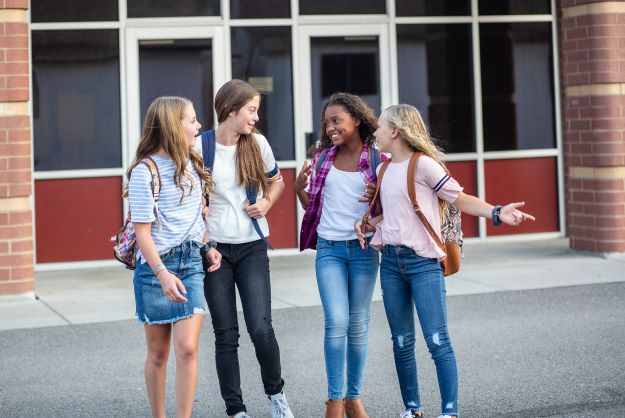In this post: We all want to raise kind kids, but sometimes as they grow, we forget about continuing to focus on strong social skills that help build confidence and inclusion. Here are 8 simple strategies to raising inclusive teens.

Recently I sat in the orthodontist office with one of my daughters. I was scrolling my phone trying to find an insurance form buried in my email when I noticed a young girl sitting across from us.
I checked her out a few times because she looked so familiar to me, but I couldn’t place her. When they called her name, I totally recognized it as one of my daughter’s classmates from elementary and middle school.
“Hi Grace!” I said loudly to her as she walked past. “How are you doing? Say hi to your mom!”
She smiled shyly and waved and kept walking back to her chair.
I asked my daughter if she had recognized the other girl, and I was surprised when she said yes.
“Well, why didn’t you say hi?” I asked. My daughter has always made friends easily and seemed to get along with most people.
“It’s just…..weird, Mom. Like I haven’t talked to her since 7th grade,” she replied.
“But you had a bajillion classes with her. You don’t just un-know her,” I stammered back.
“You just don’t get it,” she responded, and then was saved by the hygenist who went to take her back to another room.
There Are a Lot of Tweens and Teens Today Who Are Struggling with Basic Social Skills
If I’m being honest, at first I was annoyed at my daughter. I mean, from an early age I taught my kids about kindness and including others. I drilled lessons about being a good friend and standing up for those who can’t stand up for themselves. I reminded them often about being a light in this dark world.
So how could my bright, vivacious 16-year-old not be able to say hello to another kid? How did I not raise an inclusive teen?
After I calmed down, I realized I had to find some perspective. I do believe my teens are kind, but I also believe they’re not fans of this awkward stage of life right now and often are unsure about how to interact in it.
There’s a myriad of reasons that teens today struggle with social skills, or soft skills as others call them, and many of these make it a challenge for them to be more inclusive to their peers.
For example, my teens are coming off of a long two years of the pandemic where they were on remote learning for most of the time. They definitely lost valuable experiences to build confidence in how to interact with their peers.
Social media obviously also comes into play. While my teens use it in a positive way, posting fun pics, telling other teens they look “gorg,” and sending funny memes to their family and friends, I was disheartened when I saw that my teens followed their old friend on social media, but couldn’t say hello at the orthodontist’s office.
And I have to take some of the blame myself. I don’t think I’ve spent enough time modeling and teaching my kids how to interact IRL the last few years (that’s in real life for those of you not hip on the texting jargon.)
Kids Are Never Too Old to Become Includers
I couldn’t stop thinking about the incident for the rest of the day. On the one hand, it wasn’t that big of a deal. No one said anything mean.
But, on the other, we never know what someone else is facing, and I’m a firm believer that one kind gesture can change the trajectory of someone else’s day.
If my teens thought it was awkward to say hi to someone they knew for years, how could I get them to see the value off including those facing social exclusion?
How could I make them feel less awkward about social interaction and more comfortable with reaching out?
Why is it so hard to raise inclusive teens?
Kids who are kind, kids who are considerate, kids who are empathetic? How do we teach these impressionable minds to be aware of other people?
The answer is obvious. It comes from us. The parents.
How many times do you walk into a room, search out your friends and talk only to them?
How often do you walk into a room and stick your nose in your iPhone rather than talk to another person?
How often do you see someone standing off to the side and do not go over and introduce yourself? Even offer a smile?
I’m guilty.
I get it. As an extrovert, I feed off the attention of others. But sometimes I am just tired, too damn tired to strike up a conversation and keep it going with someone I don’t know.
I also know it’s hard for people who are introverts where expending that sort of energy can be draining.
But then I think about the teen who gets left out of all the social functions. The one who has no one to talk to at lunch. The one who can’t find his people because they don’t make the team or the play or the band. The one who gets picked last, or not picked at all.
I think about that girl who may have needed a hello in the orthodontist’s office that morning.

As Parents Raising Tomorrow’s Adults, We Have to Do Better
I am tired of hearing that kids today are just mean and cliques are normal or the excuses for exclusionary behavior or listening to parents that their teens didn’t do anything.
Because that is the problem. They didn’t do anything. We aren’t doing anything.
We are guilty, but too unaware to notice. Too busy to pick up on the signs.
It can be hard when your son or daughter is the bully and picks on other kids, but when we teach our children they can walk through life without noticing other people, without being aware of anyone else — well, we reap what we sow.
As parents, we do it all the time.
We talk about avoiding the PTA because of the cliques while the members forget how to welcome new faces into the fray. We attend a group once and determine the quality of the parents based on a single interaction. .We berate others on social media.
So, how do we make the change?
How do we raise inclusive teens?

Obviously, we should be teaching our kids these skills when they are young, but it’s never too old to model inclusionary behavior with our tweens and teens. Here are a few simple ways:
Teach your big kids how to meet new people
Introduce yourself to strangers in front of your child. Show them how easy it is, even if it feels awkward. Practice it at home. Show them how to shake someone’s hand and look them in the eye. Give them a few conversation starters to keep at the ready.
Create awareness
Notice when you see someone standing alone at pick up or practice, and then talk to your tween/teen about it. Encourage them to send an ecouraging text message or reach out at the next practice. Talk about quiet leadership and becoming a role model for others.
For example, a friend of mine noticed that a new player on her son’s baseball team was always standing off to the side after practice. After nagging her son for a bit to make sure he was okay, they found out that the kid was very stressed about getting to his job on time and his mom was often running late from work. They ended up starting a carpool that worked for them both and now the families are friends.
This does not mean your child needs to be friends with everyone, and in fact, it’s important for them to be able to identify toxic friendships, but getting along with other people and making others feel part of the whole is an important skill in life and in business.
Institute friend goals and share experiences
For younger tweens, set a family goal for each member to talk with someone they don’t know well each week. At dinner or another time you are all together, discuss what you learned about the new friend. Hold each person accountable for participating.
For older teens, this can be harder because they are often wanting to keep their private life private. But you should continue to talk about your own teen experience, especially as it relates to the “in-crowd” not always being the best crowd. Get to know their friends when possible. Volunteer together so you can model how to talk and interact with strangers and other volunteers. And watch how your teen interacts with others.
Watch for unintentional exclusionary behavior
This is a big one.. As parents, we often write behavior off because we know it was not intended to be mean; but how are kids supposed to learn if we don’t point it out?
When my kids were younger, I used to cringe when one of my children said, “I want to sit next to so-and-so” whenever we are at a gathering, as I know it makes other kids feel bad. I told my daughters that each time they create a stink about sitting next to a person, they are telling someone else that she doesn’t want to sit by them. We talked a lot about being grateful to have a seat at the table.
This also happens in the tween/teen years. Ensure your teen is aware of how other people may feel when they see their posts on social media (not everything needs to be documented is a good rule.) Encourage your older kids to reach out to someone who has received bad news with a kind message. And yes, still tell them to look for the teen eating alone.
Support Individuality
Allow your tween/teen to explore what makes them unique so they may see it in others as well. If your tween/teen is only focused on conforming to the latest trends, they may be oblivious to those who are different. Constantly highlight how a person’s differences, quirks, or special talents are a gift to the world. A good way to do this is to watch documentaries or listen to podcasts of some of your teen’s favorite artists, gamers, and movie personalities. Oftentimes what made these celebrities stand out was their quirkiness as opposed to their ability to conform.
You may also like to read: I Said Yes to My Tween’s Blue Hair Because Picking Your Battles is Important
The biggest fear most of us have for our children is that they will be ignored — on the playground, in the lunchroom, or at an event. So, we social engineer each activity to ensure they only go to places where they have a friend. But what are we really teaching them?
Resist the urge to only send your tweens/teens places where they have a friend, and instead, encourage them to follow their interests even if they don’t have a buddy. Learning to connect with others is a life skill they can take with them wherever they go in this world.
When we encourage our children to experience new activities by themselves, they develop compassion for others who may be in a similar situation down the road. I find the courage comes with preparing my kids beforehand with conversation starters or a script to help them introduce themselves.
Research shows that kids who have a diverse friend group (kids they know from school, athletic teams, jobs, neighborhood, etc.) are less likely to be bullied or to be a bully. That is because they have learned to get along with a wide variety of people.
We don’t realize this as parents, but kids have an uncanny ability to make friends if we just get out of the way.
Stay in Their Online World
Many tweens/teens don’t realize that liking or sharing a mean/hurtful message about someone else can be just as bad as writing it.
Make a rule of cell phone ownership and/or social media usage be that you are friends on social media. Until trust is earned, check their phones to ensure what they are posting is appropriate and inclusive.
Have your tween/teen sign a cell phone contract that talks about rules for being a good digital citizen. Talk to them about how to have healthy online interactions and how to identify toxic personalities. Give them the tools to report unsavory or illegal behavior (anonymously or to a trusted adult) and how to advocate for someone getting cyberbullied.
This can be a tricky situation since many tweens/teens have serious FOMO or fear of being ostracized/attacked/canceled themselves, so keep an eye out for any unsettling behavior or if your older kid suddenly becomes withdrawn or depressed.
Model the person you want your tween/teen to become.
We all know talk is cheap. If you want your child to be inclusive, be inclusive yourself. Lend a hand to someone you don’t know well. Keep your snarky comments to a minimum. Introduce yourself to the new neighbors. Talk to that mom or dad standing alone at pick up.
The worst thing that could happen is you may have to talk to a spitter for five minutes.
The best could be you made a very lonely person’s day.
It all starts with one brave parent.
If you want to raise inclusive teens, be brave today.
Parenting Teens and Tweens is hard! You may like these other articles our readers found helpful:
Five Simple Ways to Teach Your Teen How to Self-Advocate
9 Essential Soft Skills Every Teen Needs to Succeed in Today’s World
8 Tips to Help Your Teen Communicate More Effectively in Today’s Digital World






Leave a Comment